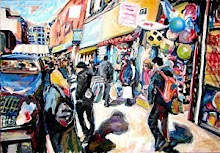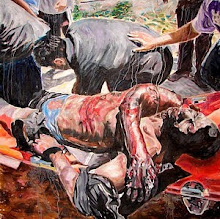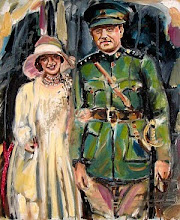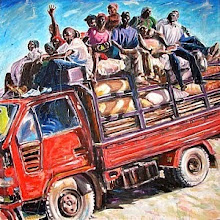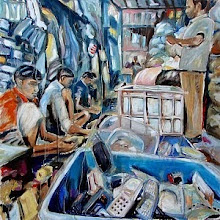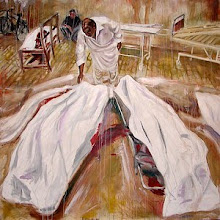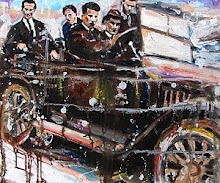The recent article
League of Nationalists in The Economist
(19-11-2016, pps. 51-54) sets out to answer the question: “All around the
world, nationalists are gaining ground. Why?”
Despite noting that “many
countries are shifting from the universal, civic nationalism towards the
blood-and-soil, ethnic sort”, the authors agree that “comparisons with the
1930s are fatuous.”
The authors also
argue that “as positive patriotism warps into negative nationalism, solidarity
is mutating into distrust of minorities”. It could also be argued that, with
the election of Trump, negative nationalism [Bushism] is warping into positive
patriotism [Trumpism] as Americans demand that their multinational corporations
be held accountable for their evasion of their responsibilities to the state which
they managed through the creation of tariff free areas [in the past state
income consisted of up to 90% of tariffs], export of jobs [outsourcing] and tax reductions [in Ireland their taxes had
been reduced to as little as 2%].
According to the
article:
“Many westerners, particularly older ones, liked their countries as they
were and never asked for the immigration that turned Europe more Muslim and
America less white and Protestant. They object to their discomfort being
dismissed as racism.”
They liked their
countries as they were before when their countries were less indebted, less
involved in military activities abroad and basic services did not roll from
crisis to crisis. After all, it was not their decision to be re-designated
‘consumer’ rather than ‘citizen’.
They also write:
“Western voters aged 60 and over – the most national cohort – have lived
through a faster cultural and economic overhaul than any previous generation,
and seem to have had enough.”
It is true they have
had enough. They have seen university fees and taxes going up and social services
going down. They have seen through immigration as mainly facilitating military
adventurism abroad. They are long in the tooth enough to know that there is no
real democracy in the EU. They want to wrest control of their society back into
their own hands for their future and the future of their naive iphone obsessed
children. Maybe for the first time in their lives they have made a political
decision that was actually in accordance with all the realisations they have
had over the years but never acted upon.
They do “dislike the balkanisation of their countries into identity groups” as they grew up with concepts like that of the ‘citizen’ where all were equal before the state in the social contract of rights and responsibilities.
These ‘nationalists’
are contrasted with liberals whose “two sources of identity: being a good global
citizen (who cares about climate change and sweatshops in Bangladesh) and
belonging to an identity group that has nothing to do with the nation
(Hispanic, gay, Buddhist, etc).” Liberals stress non-nationalist identities and welcoming in immigrants. This
is laudatory except they do this without questioning why the immigrants are
coming in and doing something about it or else they support the wars of
dominance that result in the mass migrations of their victims to safe havens
away from the ‘dictators’. The liberal dislike of any state control makes them
easy prey to those who really couldn’t care less if Bashar al-Assad, for
example, is a ‘dictator’ or not, but, rather whose geopolitical side he is
dictating on.
Some populist leaders
supporting Brexit tend to emphasise the objectives of ordinary people but
studiously avoid the agenda of the 1%. They avoid discussing the geopolitical
alignments and re-alignments of their political masters, their agendas for
global domination, their constant creation of new free trade areas, their
endless sourcing out to the cheapest labour
costs in the world, their unceasing seeking out of the lowest taxation on their
profits and their control of the media and the banks everywhere.
These populists
misrepresent people as having narrow concerns like the future of their pensions
or racist fears of immigrants ‘taking our jobs’. They seek to rile up anger to
gain support for narrow right-wing ends. For the liberals any questioning of
the weakness of the state is perceived to be a movement towards ‘fascism’. However, they miss the point. Unlike the liberals, the working class is
not afraid of a strong state. People want a state that protects their jobs,
strong borders that keep out criminals, and decent health and education systems
that their taxes are supposed to be paying for.
The vote for Trump proves that
ordinary people are very well aware of the negative sides of neo-liberalism.
Trump has talked about bringing jobs home, controlling immigration, investment
in infrastructure and creating a stronger pro-people state and the people
supported him. The people are also well aware that the liberal cry that
‘governments can’t do anything about growth’ is a sleight of hand when it is no
secret that neo-liberals are doing their damnedest to reduce the power of the
state in the first place.
The Economist article sub-heading
‘Nations once again’ refers to the poem A
Nation Once Again by the Irish poet Thomas Davis who calls on the Irish
people to throw off colonialism and take control of their own destiny. However,
the article makes a jump from the nationalism, ‘controlling one’s destiny’,
referred to in the sub-heading to a ‘better question’: “what turns civic
nationalism into the exclusive sort?”. To want jobs and better services at home
and an end to meddling in other people’s countries and economies is anathema to
the freedom of the neo-liberal elites to do whatever they like around the world
maximizing profits and monopolizing control of world markets.
Sure,
Brexit and the Trump election are good examples of passive politics, of people sitting
back, casting a vote and hoping for the best, or at least better. There is
nothing new in this, it may even be a case of ‘we pretend to vote and you
pretend to lead’. In the past the dangers of passive politics were pointed out
by various writers such as James Connolly who wrote: “If the national movement of our day is not
merely to re-enact the old sad tragedies of our past history, it must show
itself capable of rising to the exigencies of the moment.”[1]
Frantz Fanon
also pointed this out in The Wretched of the Earth:
“We have seen […]
that nationalism, that magnificent song that made the people rise against their
oppressors, stops short, falters and dies away on the day that independence is
proclaimed. Nationalism is not a political doctrine, nor a programme. If you
really want your country to avoid regression, or at best halts and
uncertainties, a rapid step must be taken from national consciousness to
political and social consciousness.”[2]
Jean-Jacques
Rousseau was aware of the dangers of passive politics. He advocated a more proactive approach of continual political
activity. He wrote,
(notwithstanding the existence of slavery at the time), “[a]mong the Greeks,
whatever the people had to do, they did themselves; they were constantly
assembled in the market place.”[3]
It
is likely that Trump will disappoint his supporters given the limitations of
his new position but the possibilities for change signaled by Trump should give
people hope and make them realise that only by getting out on the streets and
showing their strength in numbers, choosing their own representatives and
leaders and demanding change will anything progress.
[1]
P. Beresford Ellis, ed., James Connolly: Selected Writings (Middlesex:
Pellican, 1973) 121.
[2]
Frantz Fanon, The Wretched of the Earth (London: Penguin, 1990) 163.
[3]
Jean-Jacques Rousseau, The Social Contract or Principles of Political Right
[1762] (Hertfordshire: Wordsworth Editions Ltd., 1998) 45.
